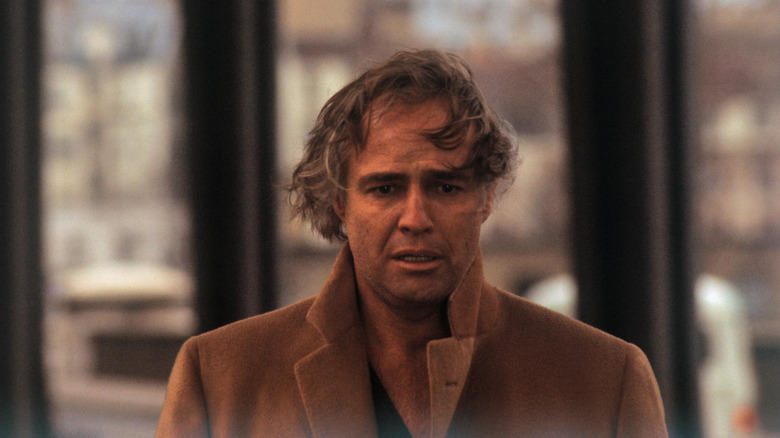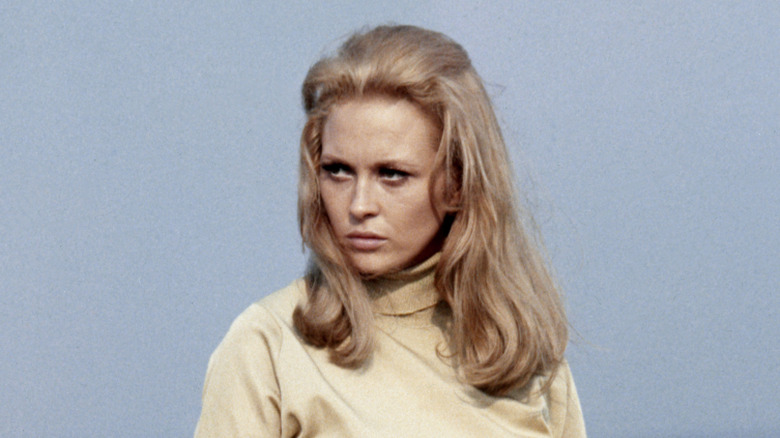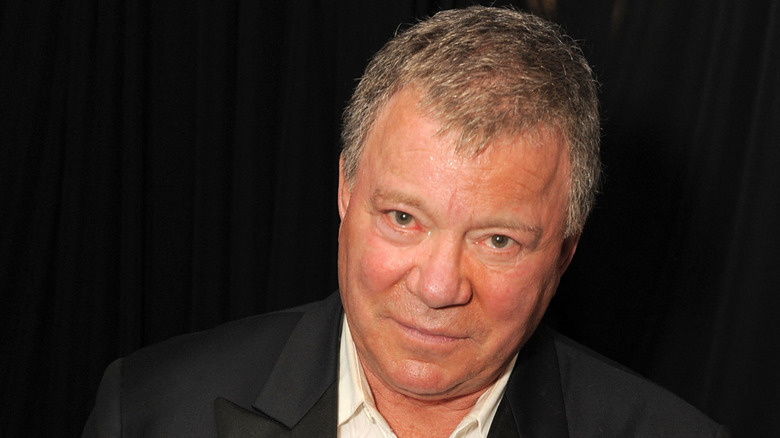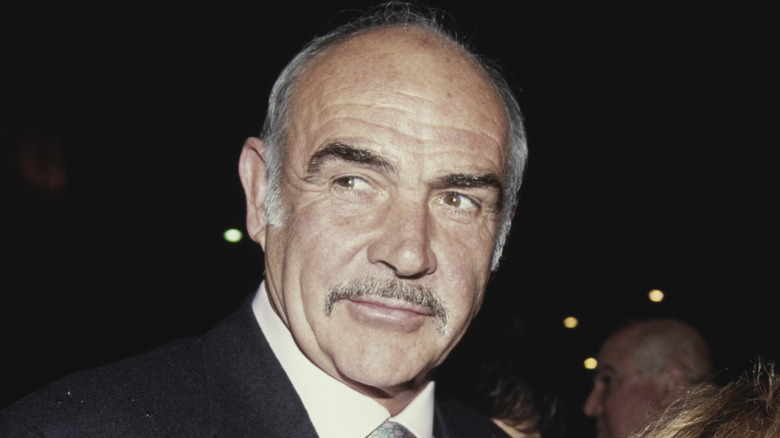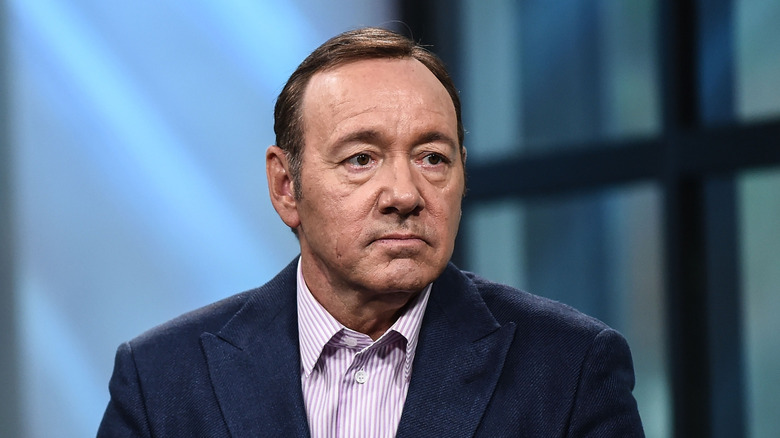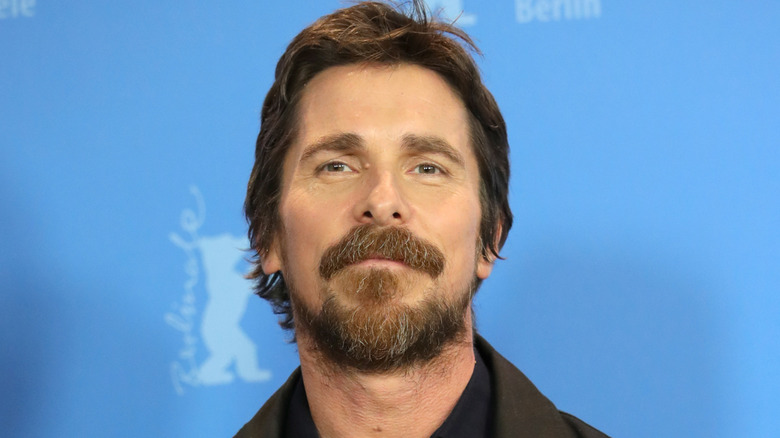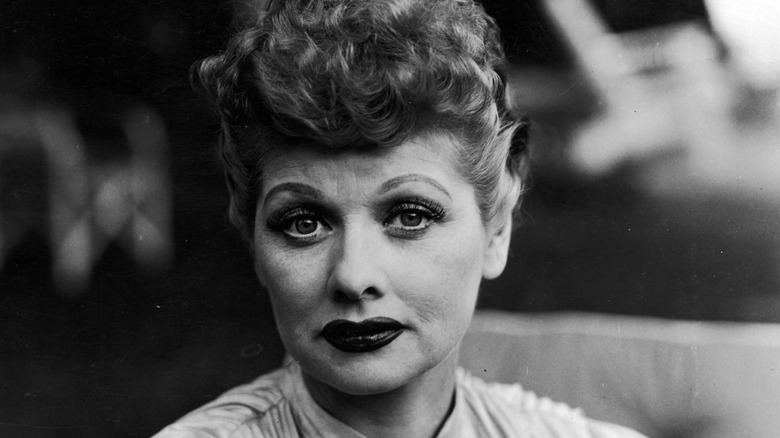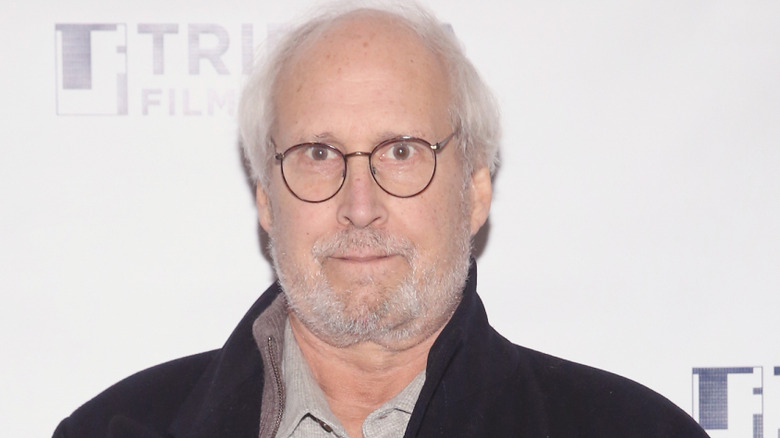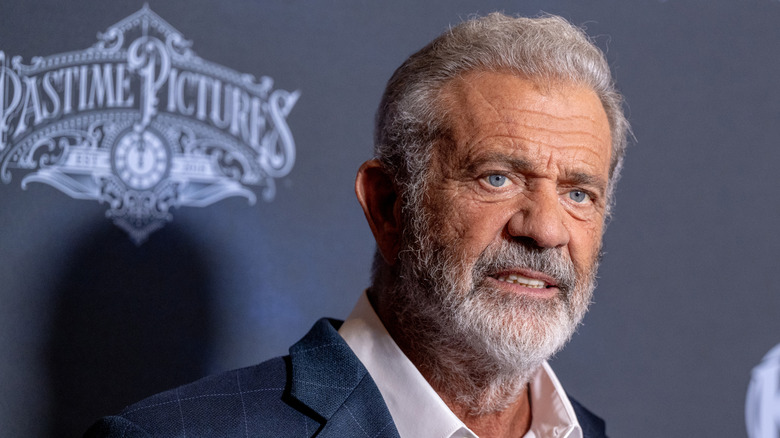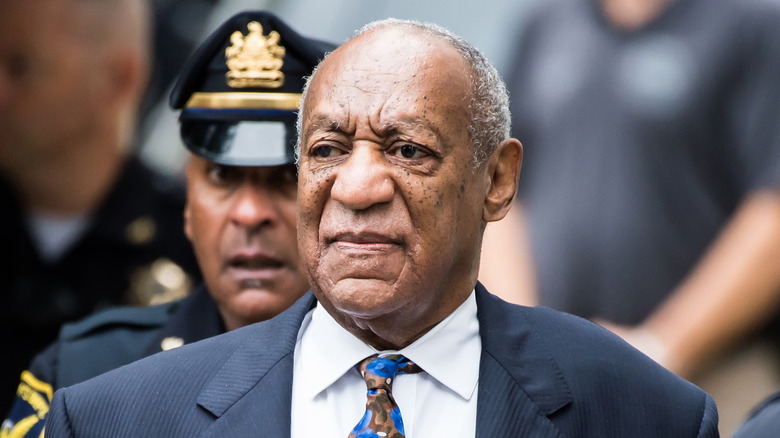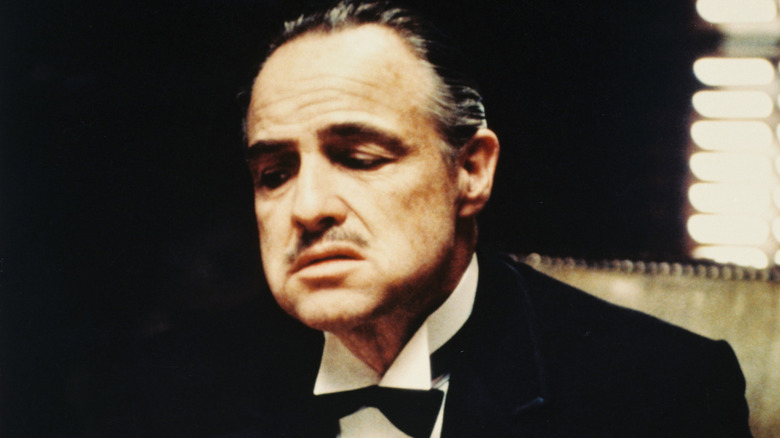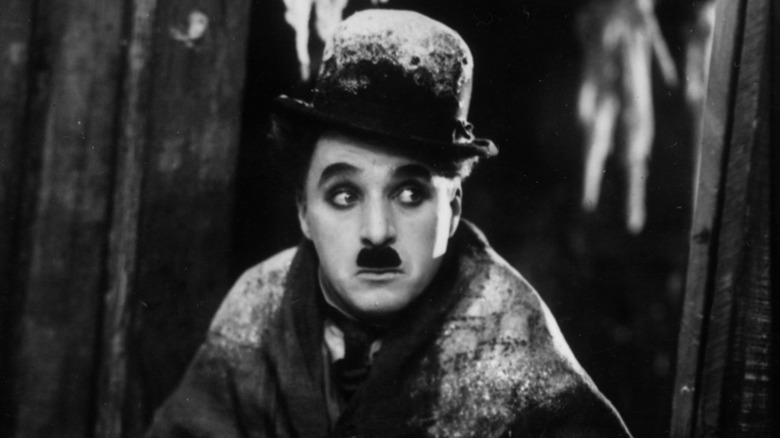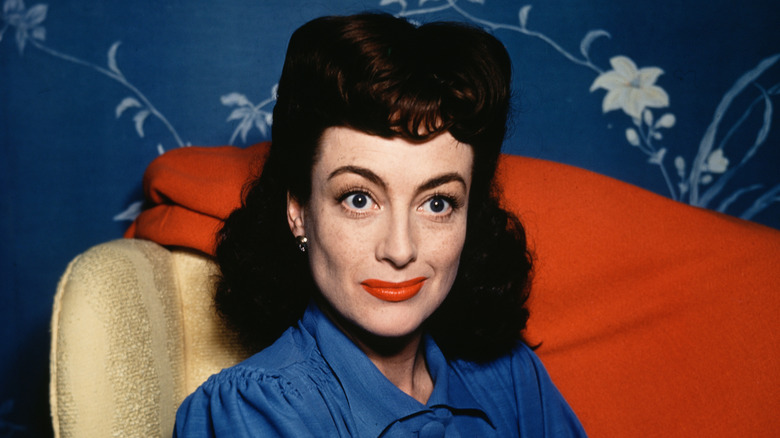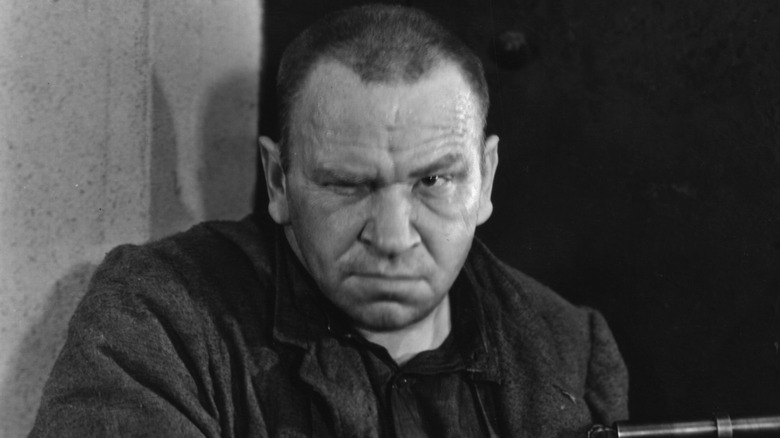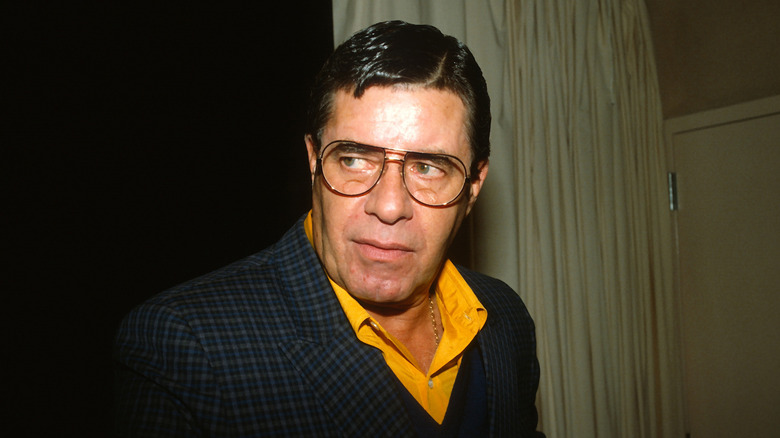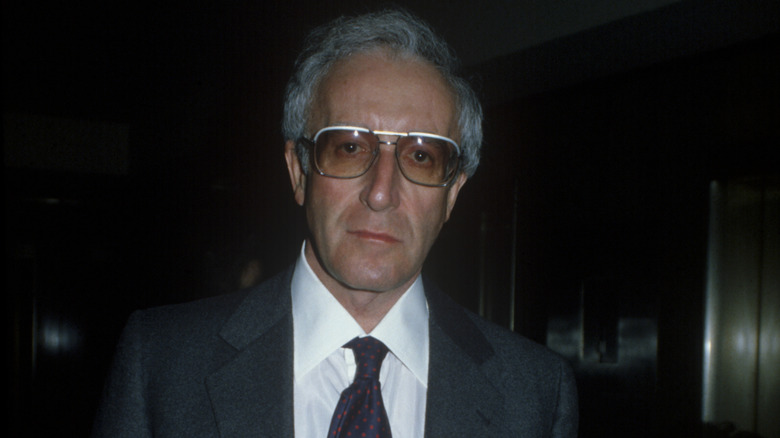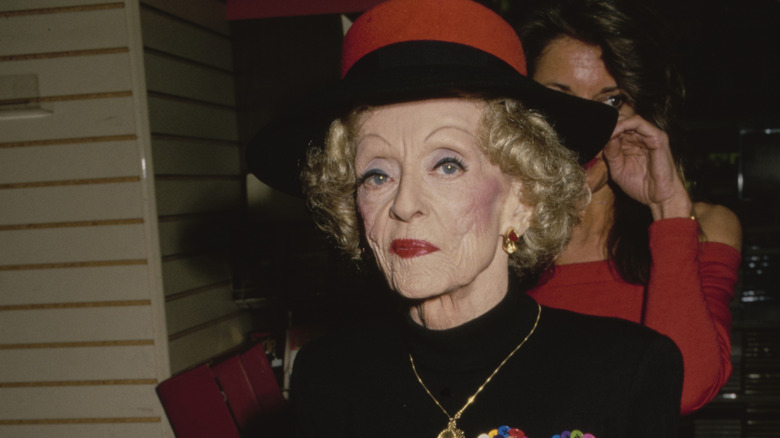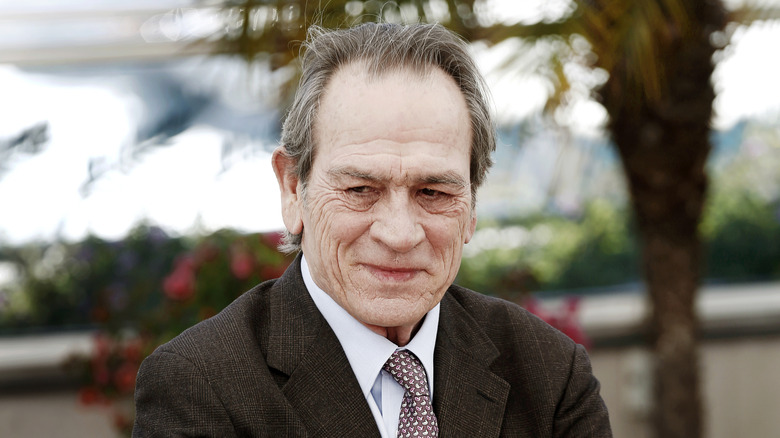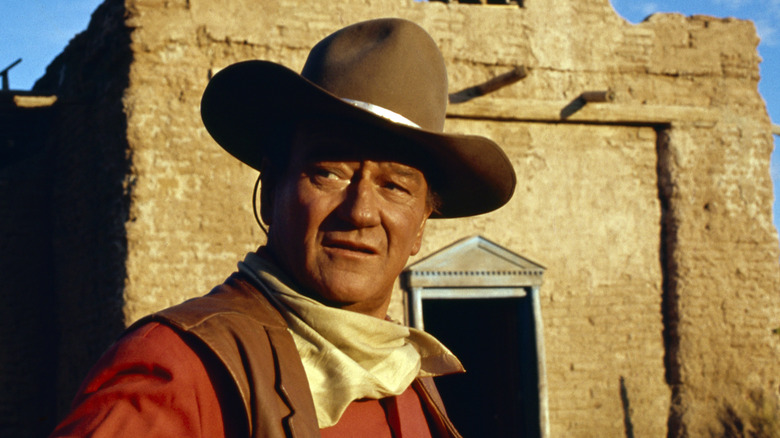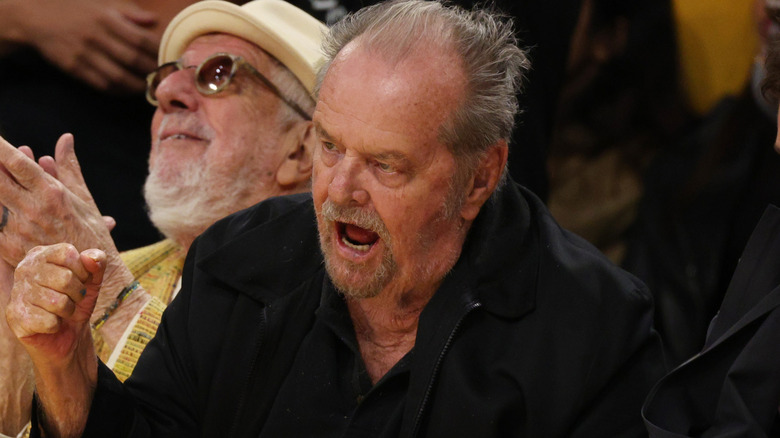22 Acting Legends Who Were Nightmares In Real Life
We may receive a commission on purchases made from links.
Ever since the invention of cinema, great actors have been revered by audiences. Being able to convincingly inhabit another character is indeed a rare and unique skill, and those who are expert at it have tended to enjoy fame, fortune, and all the perks that go hand-in-hand with stardom. Viewers tend to become swept up into the stories told onscreen, and it's easy to assume that actors are similar to the characters they play. Sadly, that isn't always the case. In fact, Hollywood history is replete with stories of famous thespians whose actual personalities were far less appealing than what viewers see on film and television.
This can understandably create confusion with fans, particularly when a star known for playing noble, heroic roles is discovered to be a complete jerk when not performing in front of a camera. For a look at how that situation has played out over the years, here's a rundown of 22 acting legends who were nightmares in real life.
The following article includes allegations of child abuse, domestic abuse, and sexual assault.
Faye Dunaway
These days, some may wonder what happened to Hollywood icon Faye Dunaway, one of the hottest female movie stars during the 1970s. Lauded for roles in films such as "Bonnie and Clyde," "Three Days of the Condor," and her Oscar-winning performance as a cynical, ambitious TV executive in "Network," Dunaway also earned notoriety as a diva perfectionist with a tendency to clash with co-stars and directors. Roman Polanski, who directed her in "Chinatown," didn't hold back when he described Dunaway as "a gigantic pain in the ass" when interviewed by Rolling Stone, adding, "You have, I guarantee, never seen such certifiable proof of craziness."
That reputation did not recede as the years passed. In 2019, she was fired from the Broadway production of "Tea at Five," amid reports she was difficult to work with and created a toxic environment. While there were rumors she'd verbally and physically abused crew members, those claims weren't exactly shut down by the terse statement that producers issued, which stated (via The New York Times): "The producers of 'Tea at Five' announced today that they have terminated their relationship with Faye Dunaway."
Hollywood legend Bette Davis had worked with Dunaway in a made-for-TV movie, and revealed during an appearance on "The Tonight Show" that Dunaway was a nightmare to work with. "Everyone you can put into this chair will tell you exactly the same thing," Davis declared. "She's very unprofessional. A difficult woman," she added.
William Shatner
Revered by fans of "Star Trek," William Shatner has been continually derided by his "Trek" co-stars over the years, with varying reports of what Shatner's on-set behavior is really like. While most members of the original Enterprise crew have trashed Shatner over the years, it's been George Takei who's had the most to say. "Shatner is a cantankerous old fossil. All of us have had problems with him," the erstwhile Lt. Sulu told The London Times. "Bill is an egocentric, self-involved prima donna."
Shatner's treatment of his fellow "Star Trek" actors extended to the next generation — literally. That was the experience of teenaged "Star Trek: The Next Generation" star Wil Wheaton, who documented Shatner's rude dismissiveness toward him when meeting for the first time in his book, "Dancing Barefoot." According to Wheaton, series creator Gene Roddenberry called him up and assured him he'd done nothing wrong. "Wil, Bill Shatner is an ass," Roddenberry told Wheaton.
Over the course of decades, Shatner and co-star Leonard Nimoy remained professionally connected. The truth, however, is that Nimoy couldn't stand Shatner. "There is this fiction that Bill and Leonard were good friends, but we know better — Leonard privately expressed his irritation with Bill," Takei said. It speaks volumes that Nimoy was reportedly not on speaking terms with Shatner when he died in 2015. When Shatner skipped Nimoy's funeral, the media gifted him with a new nickname: "Captain Jerk."
Sean Connery
Best known for portraying British super-spy James Bond, Sean Connery was admired by audiences, but he could be prickly with those he worked with. When he learned a producer he disliked had suffered a stroke and was paralyzed on one side, for example, Connery shared his hopes that the paralysis would spread to the other side as well.
It was Connery's old-school views on women, though, that really struck a nerve. "I don't think there is anything particularly wrong about hitting a woman, although I don't recommend doing it in the same way that you'd hit a man," Connery remarked during a 1965 interview with Playboy, suggesting women be hit with an open hand, not a closed fist. Decades later, Barbara Walters confronted Connery with his own words, but he was unrepentant. "I haven't changed my opinion," Connery declared. "I don't think it's that bad [to slap a woman], and I think it depends entirely on the circumstances or if it merits it." That was apparently the experience of Connery's first wife, Diane Cilento, who alleged he'd physically and mentally abused her throughout their marriage.
Connery was also famously litigious, such as the time the actor and his NYC neighbor flung a flurry of lawsuits at each other, over claims that Connery was attempting to bully the other guy into leaving the townhouse they shared. The legal battle grew so ugly that the judge barred both parties from filing any further litigation without her permission.
Bill Murray
Few actors are as universally beloved as Bill Murray, yet a darker side has emerged. In fact, there are many stars who can't stand Murray, including his "What About Bob" co-star Richard Dreyfuss. Dreyfuss recalled an ugly encounter with Murray about some proposed script changes. "He was an Irish drunken bully, is what he was," Dreyfuss told Yahoo! Entertainment. "And he put his face next to me, nose-to-nose. And he screamed at the top of his lungs, 'Everyone hates you! You are tolerated!'" According to Dreyfuss, Murray punctuated his comments by hurling a large ashtray at him.
While making "Quick Change" (which Murray also directed), he angrily shouted at co-star Geena Davis. He insulted Lucy Liu while making "Charlie's Angels," while the film's director, McG, alleged that Murray head-butted him in a fit of rage. Murray also clashed with director Harold Ramis (his co-star in "Stripes" and "Ghostbusters") while making "Groundhog Day," sparking a bitter feud that didn't end until Ramis was on his deathbed.
When it comes to notorious incidents, though, the list is topped by Murray's behavior on the set of "Being Mortal" in 2022. Starring in what would have been the directorial debut of comedian Aziz Ansari, allegations of sexual harassment from an unidentified woman resulted in Murray paying her a $100,000 settlement, while also shutting down the entire movie. "I did something I thought was funny and it wasn't taken that way," Murray explained during an interview with CNBC.
Kevin Spacey
In 2017, Kevin Spacey was among Hollywood's most respected actors, winner of two Academy Awards, and recipient of several Emmy nominations for his performance as a ruthless politician in Netflix's "House of Cards." It all came crashing down when actor Anthony Rapp went public to allege that Spacey attempted to hook up with him when he was just 14. Spacey responded by coming out publicly as gay. Rapp's claim, however, opened the floodgates as other similar allegations began spilling out. Suddenly, Spacey was portrayed as a sexual predator with an apparently established pattern of making sexual advances toward young actors.
Spacey was suspended and entered treatment, while production on "House of Cards" was shut down. During Spacey's suspension, other men came forward with more accusations, including 20 alleged incidents at the Old Vic. Spacey was fired, and subsequently ordered by a judge to pay Netflix $31 million in restitution for the "House of Cards" production delays that his scandal had created (the amount was subsequently reduced to just $1 million). Meanwhile, Spacey was considered so toxic that his role in the film "All the Money in the World" was reshot with another actor, at a reported cost of $10 million.
Spacey weathered several police investigations, was acquitted in a U.K. criminal trial, and ultimately found not guilty of molesting Rapp. Despite his court victories, the scandal brought what had been a wildly successful acting career to a bitter end.
Christian Bale
Christian Bale has gained a reputation as an actor's actor, yet in tandem with that have come reports of a volatile temper. While making his trilogy of Batman movies, crew members reportedly learned to walk on eggshells around him; according to Bale's former personal assistant, the actor was nicknamed "Tandy" while making the film "Metroland" because of his penchant for throwing temper tantrums.
One of those tantrums was captured on audio, landing Bale among the many actors who crossed the line on set. While filming a scene for "Terminator: Salvation" in 2009, he erupted in fury at the director of photography for landing in Bale's eyeline while adjusting lights. "What the f*** are you doing? Are you a professional or not?" Bale screamed at the guy, launching into a vicious tirade, laden with F-bombs. Unfortunately for Bale, his rant was leaked and quickly went viral. Bale later issued an apology while appearing on a Los Angeles morning radio show. "I was out of order beyond belief," Bale admitted, as reported by The Guardian. "I make no excuses for it."
That wasn't the only time Bale's temper had been on public display. The previous year, his mother and sister filed charges with London police, claiming that Bale had assaulted them. He denied the allegation, but turned himself in and was released on bail after being briefly placed under arrest.
Lucille Ball
Beloved by millions as ditzy hausfrau Lucy Ricardo in iconic sitcom "I Love Lucy," Lucille Ball had another side that viewers didn't see. That was her other gig, as the head of Desilu Studios, a role she assumed after her split from Desi Arnaz.
Running a studio required a significant amount of grit. Ball's friend and fellow TV legend Carol Burnett recalled that Ball could be a perfectionist, refusing to censor herself if she felt something wasn't up to snuff. According to Burnett, prior to the divorce, Arnaz handled all the production elements of "I Love Lucy," and all Ball had to do was show up and perform. "And she said, 'And then we got divorced,' Burnett recalled in an interview with the Television Academy. "And she said, 'And that's when they put the S on the end of my name.'" As Burnett pointed out, "She had to be tough. No one would listen to crazy little Lucy, so she had to be truthful, and it was unheard of for the women to do that."
When screenwriter and director Aaron Sorkin was preparing to write the 2021 biopic "Being the Ricardos," he met with Ball's daughter, Lucie Arnaz. She confirmed that her mother could be no picnic. "We all had lunch together, and she said to me, 'I know my mother wasn't an easy woman. Take the gloves off.' In other words, you can go for it," Sorkin told The Hollywood Reporter.
Chevy Chase
In the annals of the tangled life of Chevy Chase, tales of his rudeness to co-stars date back to his days on "Saturday Night Live." That, in fact, culminated in Chase's infamous fistfight with Bill Murray when Chase returned to the show as host after quitting.
When he was a member of the cast of NBC sitcom "Community," stories of obnoxious behavior bubbled to the surface. The first salvo was fired by "Community" creator Dan Harmon, who proclaimed his feud with Chase when he publicized a private voicemail Chase left him complaining about the show's lack of laughs. That, however, was just a warmup for a 2012 incident that took place while Chase filmed a scene with co-stars Donald Glover and Yvette Nicole Brown. Reportedly frustrated with his character's dialogue, Chase erupted in anger and used a racial slur. Production was shut down, and Chase later apologized to the entire cast and crew.
Meanwhile, Chase has not been shy about sharing his negative opinions of other stars to emerge from "SNL." During a scorched-earth interview with The Washington Post, for example, he trashed Will Ferrell. "Just not funny," Chase said. "Makes $25 million a movie." "SNL" alum Pete Davidson fired back in a 2018 appearance on "The Howard Stern Show." "He's a f***ing douchebag," said Davidson of Chase, as reported by Variety. "I hate that dude. He's just a genuinely bad, racist person, and I don't like him ..."
Mel Gibson
An infamous 2006 traffic stop in Malibu tore the movie-star sheen off Mel Gibson. Pulled over when cops clocked him going 87 mph in a 45 mph zone, Gibson took a breathalyzer test, and was subsequently charged with DUI when his blood-alcohol level was found to be well above the legal limit. It was Gibson's altercation with the officers, however, that made further headlines when it was revealed he'd launched into an angry, antisemitic rant, accusing Jews of being responsible for every war ever fought and even asking one of the cops if he was Jewish.
Shortly after that incident, Gibson and his wife separated. Gibson became a pariah and wound up losing half his $850-million fortune in one of the most expensive divorces in history. He then took up with Russian musician Oksana Grigorieva, with the two having a child together.
Their breakup was bitter, particularly after Grigorieva accused Gibson of beating her, knocking out her two front teeth, and leaving her with a concussion. She also leaked furious voicemails from Gibson, in which the unhinged actor threatened her life. According to a transcript published by TheWrap, Gibson promised to put her "in a f***ing rose garden ... Because I'm capable of it." Those voicemails also contained a variety of racist language, leading to his condemnation by African-American leaders. "No amount of words will change his image as an out-of-date and out-of-control racist," the NAACP's LA president, Leon Jinkins, told TMZ.
Bill Cosby
Once known as "America's Dad" after the massive success of TV sitcom "The Cosby Show," comedian Bill Cosby's fall from grace was stunning. It all began back in 2005, when Cosby paid Andrea Constand — a former employee of his alma mater, Temple University — a settlement to halt a lawsuit accusing him of drugging her and then sexually assaulting her. That amount was later revealed to be $3.38 million. A decade later, Constad's accusations resurfaced in the media, leading to an avalanche of women — more than 60 — going public with similar allegations against Cosby. Spanning decades, the accusations were striking in their similarity: Cosby would offer a drink or pill to his victims, who would become woozy and pass out, awakening to realize he'd had sex with them while they were unconscious.
In 2015, Cosby was criminally charged with sexually assaulting Constand. He was subsequently convicted and sentenced to three to 10 years in prison. He was freed in 2021, spending three years behind bars before his conviction was overturned.
Meanwhile, Cosby's comedy routine about slipping Spanish Fly — a purported aphrodisiac — into women's drinks also resurfaced. A 1991 interview with Larry King, in particular, had not aged well. "Spanish Fly was the thing that all boys from age 11 on up to death, we will still be searching for Spanish Fly," Cosby said. "And you put it in a drink ... And the girl would drink it and..." King jumped in to finish Cosby's thought: "And she's yours."
Marlon Brando
Marlon Brando is widely regarded as one of the finest actors of his generation, known for indelible screen performances in numerous films, ranging from "A Streetcar Named Desire" to "The Godfather" to many others. He was also, according to those who knew him well, a hugely problematic personality. Oscar-winning actor Rita Moreno was Brando's girlfriend in the 1950s, and described their eight-year romance as "exciting" but ultimately damaging. "He was extraordinary in many, many ways, but he was a bad guy," Moreno told Variety. "He was a bad guy when it came to women."
His penchant for bad behavior also made its way to movie sets. According to Maria Schneider, Brando's 19-year-old co-star in "Last Tango in Paris," the film's infamous "butter scene" was not in the script. She claimed Brando conspired with the director to spring it on her by surprise, leaving her emotionally and psychologically damaged for years afterward.
Schneider wasn't the only one of Brando's co-stars to share less-than-laudatory memories of him. Richard Harris, who worked with Brando on "Mutiny on the Bounty," admired him greatly as an actor, but admitted the experience of working with him was awful. "The whole picture was just a large dreadful nightmare for me, and Brando was just a large dreadful nightmare for me," Harris told the Saturday Evening Post. "I'd prefer to forget both as soon as my nerves recover from the ordeal."
Charlie Chaplin
Charlie Chaplin is revered by cinephiles, regarded as a comedic genius and one of the true trailblazers of the art form of cinema. Chaplin also had a dark side, embarking on relationships with females who were uncomfortably younger than him. That was clear when Chaplin, nearing 30, married 16-year-old Mildred Harris, whom he'd impregnated when she was just 15.
After their divorce, he began dating teenage actor Lita Grey, who was just 12 when he first met her. They married when she was 16 and he was 35. His third wife, famed actor Paulette Goddard, was a bit older, all of 26 when she married 47-year-old Chaplin. He married for the fourth and final time when he was 53, exchanging vows with Oona O'Neill, who was just 18 when she walked down the aisle.
Chaplin was far from a model husband. Or at least that was the contention that Grey made during their contentious divorce. In court papers, Grey claimed that the only reason he married her was to avoid criminal charges, reportedly joking to friends that he figured getting married was preferable to going to prison. In her divorce filing (as reported by the Daily Mail), she characterized Chaplin's treatment as "cruel and inhumane," claiming that Chaplin told her, "This marriage won't last long, I will make you so damn sick of me that you won't want to live with me."
Joan Crawford
Joan Crawford's ruthless rise to stardom has become well established; in fact, author Roger Dance titled his biography about her "Ferocious Ambition." Crawford was known to have clashed with other stars, including Norma Shearer and Mary Pickford, but it was Crawford's legendary feud with Bette Davis that fueled gossip columns, and even served as the basis for an entire TV series, "Feud: Bette and Joan."
However, it was the tell-all book written by her daughter, Christina Crawford, that really cemented the public's perception of Crawford as cruel and sadistic. Published shortly after Crawford's death, "Mommie Dearest" shared horrific tales of child abuse, characterizing her adoptive mother as a narcissist and violent alcoholic with a flair for manipulation. Arguably the most shocking recollection in the book is Christina's claim that, when she was just 13, the "Mildred Pierce" star attempted to strangle her, then punched her in the face, and slammed her head against the floor. "You never forget that," Christina told The Guardian, remembering her mother's murderous rage. "It was up close and personal. She came this far from my face, and you could see it in her eyes, you can see if someone is trying to kill you."
Her brother, Christopher Crawford — who ceased all contact with his movie-star mom in 1961 — shared bitter memories when interviewed by the Los Angeles Times (via Joan Crawford Best). "She was not a mother," he said. "I honestly to this day do not believe that she ever cared for me."
Wallace Beery
Legendary character actor Wallace Beery appeared in numerous films after making his screen debut in 1913, ranging from playing a washed-up boxer in "The Champ" to pirate Long John Silver in "Treasure Island." He may have been a favorite with moviegoers, but was reportedly loathed by pretty much every actor he ever worked with. Jackie Cooper, his child-actor co-star in "The Champ," wrote about Beery in his autobiography, "Please Don't Shoot My Dog," declaring, "I really disliked him." Meanwhile, a long-standing (but unproven) rumor contended that he and some others beat Ted Healy (straight man for the Three Stooges) to death in a nightclub parking lot.
Beyond that, Beery is depicted as a sadistic monster in the autobiography of silent-movie legend Gloria Swanson, to whom he was briefly married. According to Swanson, she was just 16 when Beery — twice her age — began romancing her. Their wedding night was harrowing for Swanson, who wrote that Beery savagely raped her. "I begged him to stop ..." she wrote in "Swanson on Swanson." "The pain became so great I thought I must be dying."
They were not married for long. According to Swanson, after that encounter had resulted in a pregnancy, Beery tricked her into taking "medicine" that caused a miscarriage. She filed for divorce two months after the wedding. Beery wouldn't agree to grant a divorce, however, and forced the process to drag on unnecessarily out of spite.
Jerry Lewis
After springing to success as part of a comedy duo alongside crooner Dean Martin, Jerry Lewis struck out on his own as star and director of slapstick comedies such as "The Nutty Professor." Despite his lovably goofy onscreen persona, Lewis could also be a prickly, arrogant jerk. That would occasionally surface when he hosted the annual MDA telethon, as demonstrated by one now-infamous clip in which he sarcastically told off the bandleader.
That paled in comparison to his cringe-inducing final interview, held on camera for The Hollywood Reporter. Conducted less than a year before his 2017 death, Lewis was reportedly irked by how long it had taken to set everything up. By the time the interview began, the clearly fuming 90-year-old became as uncooperative as possible, dismissively offering one-word answers. The interview lasted less than two minutes.
Five years after his death, a 2022 Vanity Fair exposé shared allegations of sexual misconduct from women who'd worked with Lewis. Actor Karen Sharpe co-starred with Lewis in "The Disorderly Orderly," and recalled being in the midst of a costume fitting when Lewis barged in and ordered everyone else out of the room. "He grabbed me," Sharpe said. "He began to fondle me. He unzipped his pants. Quite frankly, I was dumbstruck." Another co-star, Hope Holiday, said Lewis pulled a similar stunt on her, taking things further when he began pleasuring himself. "I was frightened ... I just sat there and I wanted to leave so badly," she remembered.
Peter Sellers
Peter Sellers' comedic brilliance is undisputed, yet so are the numerous anecdotes about his explosive temper. "Like most clowns, he had a dark side," Bryan Forbes — who directed Sellers in 1966's "The Wrong Box" — told DGA Quarterly. Blake Edwards, director of the "Pink Panther" movies, recalled that Sellers eventually "became a monster. He just got bored with the part and became angry, sullen and unprofessional ..." After making their final film together, Edwards cut ties with his star. "There was no reconciliation before he died, nor did I want any," Edwards told the publication. "He was just too crazy."
His wives — Sellers was married four times — also bore the brunt of his dark personality. His second ex-wife, model and actor Britt Ekland, came to believe that Sellers had undiagnosed bipolar disorder. "He was a very tormented soul who should have had more help," Ekland said in a 2020 documentary, "Peter Sellers: A State Of Comic Ecstasy" (via The Guardian), having ended their four-year marriage due to his psychological abuse. "There was no real Peter Sellers," she later told The Guardian. "Peter Sellers only ever lived when he had an audience. He was silent and had no real interests."
Interviewed by The Scotsman, Sellers' son, Michael Sellers, recalled a turbulent childhood, his father prone to flying into unpredictable rages. "Dad did some horrendous things to me and my sister Sarah," he said. "I've been hardened by them, but I try not to be too cynical."
Bette Davis
Bette Davis possessed a sharp tongue and did not hold back when it came to sharing her opinions. Producer William Frye was her friend for seven years during the 1950s, and wrote an essay about the experience for Vanity Fair. "From the start, I realized that having Bette Davis work for you was a mixed blessing," Frye wrote. "She was a magnificently talented actress, but the emotional baggage she brought with her was awesome."
One example he cited was the time Davis refused to allow her face to be photographed during a crucial scene, insisting the director film the back of her head. Frye had no choice but to confront her. "I went to her dressing room, and the scene that followed was every bit as nasty as I feared it would be," he wrote.
Ultimately, Frye remembered Davis as a "bundle of contradictions," something he felt was typical of most artists. "On the one hand she could be a moody and petulant bully, who carefully cultivated inflexible opinions and fostered great hates," Frye wrote, noting that she also possessed a huge capacity for compassion for those she considered friends. "Not many people got to see that side of her," he added, "but it's the side I like to remember."
Tommy Lee Jones
A four-time Oscar nominee (and winner of one), Tommy Lee Jones garnered a well-earned reputation for being cantankerous with interviewers. For example, he began a 2006 interview with Texas Monthly by challenging (via The Atlanta Journal-Constitution), "What do you want to ask me?" He was also characteristically prickly when interviewed by the latter publication. When asked how he related to his character in "The Homesman," a film he'd also written and directed, he replied, "I wrote this character and did my best to play him." Next question.
Meanwhile, stories abound of Jones' on-set surliness. The most legendary of these comes from "Batman Forever," in which Jones played comic book villain Two Face alongside Jim Carrey as the Riddler. To say that Jones didn't get along with Carrey is putting it mildly. During an appearance on "Norm Macdonald Live," Carrey recalled the friction he experienced from Jones throughout filming. "I was the star and that was the problem," Carrey observed.
Carrey also remembered seeing Jones at a restaurant prior to the two shooting their big scene together, and he approached him at his table. "The blood just drained from his face," recalled Carrey, describing how Jones drew him in for a hug, and then quietly whispered, "I hate you. I really don't like you." According to Carrey, he then pulled up a chair — perhaps unwisely — and sat down at Jones' table. "And he said, 'I cannot sanction your buffoonery,'" Carrey added.
John Wayne
After decades of playing a cowboy hero in numerous westerns in the 1940s and '50s, John Wayne was not a fan of the counterculture that emerged in the latter years of the 1960s. "We allowed all the hippies to stay together in Haight-Ashbury and turn it into a dirty, filthy, unattractive place," he said in a now-infamous 1971 interview with Playboy (via The Wrap), in which he expressed an array of racist and homophobic views.
Deriding the state of Hollywood at the time, he singled out the film "Midnight Cowboy" by using a homophobic slur to describe the main characters' relationship. He also railed against liberals and communists, which segued into a racially charged discussion. Wayne declared, "I believe in white supremacy until the Blacks are educated to a point of responsibility." He went on to say, "I don't feel guilty about the fact that five or 10 generations ago these people were slaves ... I will say this, though: I think any Black who can compete with a white today can get a better break than a white man."
Wayne also seemed irked about movie studios forcing him to cast Black actors in his movies. "I've directed two pictures and I gave the Blacks their proper position," he said. "I had a Black slave in 'The Alamo,' and I had a correct number of Blacks in 'The Green Berets,'" he said. "But I don't go so far as hunting for positions for them."
Jack Nicholson
Jack Nicholson is regarded as one of Hollywood's finest actors, yet he also gained a reputation for hotheadedness. That was evident in 1994, when, while driving to play a round of golf, a car cut him off. When he and the other motorist pulled up at the same light, Nicholson got out of his car, grabbed a golf club from his trunk, and smashed the other vehicle's windshield. "I was out of my mind," Nicholson admitted when recounting the incident during an interview with Golf Digest, recalling that, despite his rage, he was still cogent enough to grab his 2-iron, a club he rarely used on the course.
Nicholson's fiery temper has flared up on other occasions. For example, a woman claimed she got into a physical altercation with Nicholson during a party at his home, alleging that he shoved her with so much force that he ruptured her silicone breast implant. Then there was the 2000 lawsuit filed against him by Catherine Sheehan, a sex worker who alleged to have been hired by the actor. According to her lawsuit, reported The Guardian, the situation turned violent when she asked to be paid the $1,000 she was owed. Nicholson allegedly responded with anger, claiming he never paid for sex, and made his point by pulling her hair and bashing her head on the floor. Nicholson had already paid her more than $30,000 in damages, but her lawsuit demanded more.
If you or anyone you know may be the victim of child abuse, is dealing with domestic abuse, or has been a victim of sexual assault, contact the relevant resources below:
-
The Childhelp National Child Abuse Hotline at 1-800-4-A-Child (1-800-422-4453) or contact their live chat services.
-
The National Domestic Violence Hotline at 1−800−799−7233. You can also find more information, resources, and support at their website.
-
The Rape, Abuse & Incest National Network website or contact RAINN's National Helpline at 1-800-656-HOPE (4673).
